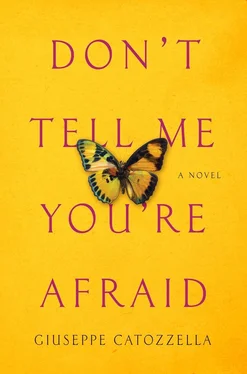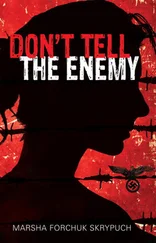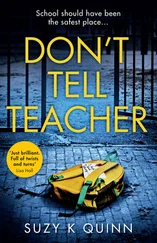I spent twenty-eight endless days prowling around like a ghost among ghosts. At night I couldn’t sleep because of the heat, and during the day I tortured myself, weak as I was, looking for a corner with a speck of shade. I wanted to train, do some exercises, stretch my muscles leaning against the wall. But the peanuts weren’t enough; I had no energy. My vision clouded over; when the sun was at its peak, I had hallucinations. Sitting on the ground, my back against a wall, I saw Aabe, the courtyard, the eucalyptus. I thought I was up there with Alì, hidden among the cool branches. Or on the mattress in the evening, holding Hodan’s hand tightly. I didn’t even have the money to call her or Hooyo.
There was nothing I could do except sit there and wait. With the part of my brain that remained alert, I felt that I was slowly but surely losing touch with myself. I was giving up; I no longer had the strength. At times I thought it didn’t matter to me: I would stay there on the ground forever.
Then too, day and night, I would dream about delicious foods. The breakfast buffet at the hotel in Beijing. It had everything: fruit juices, hard-boiled or scrambled eggs, sausages, beans, mushrooms, tomatoes, coffee, tea, cappuccino, hot chocolate, croissants, biscuits with honey, toast, cold cuts, cheeses. And someone to serve me. Every day I went over that food in my mind. And to think I hadn’t even tried it all. I sat there for days, out of my mind. I was out of my mind.
Until the money from Hodan arrived and I paid.
Finally I could go, I could leave Kufra.
Then they showed me what would be my home for the next week of the Journey.
A freight container with no light and just a small opening at the top to let air in. I would share it with two hundred and twenty other people. Without saying a word, now as worn-out as the tattered rags we wore, we climbed in.
Being in a container is like being in a gas chamber. The sun heats the metal walls to such a degree that after a few hours everything is vaporized. Breath, urine, feces, vomit, sweat. Everything evaporates in a toxic cloud that obstructs your breathing.
For the first stretch, maybe half an hour, we stood, as if we were about to get off at any moment: We didn’t know how to act, what to do. Then we sat on the floor, and we soon learned that the only way to support your back was to lean against someone else’s body.
The metal sheets of the walls were scorching hot, like fire. We tried to stay as close to the center as possible to keep away from the heat that was inescapable; it stole your breath and erased your thoughts. When we were little and got sick, Hooyo would put mint leaves and rosemary in a pot of water and boil it. Then she would make us lean over it for hours, our heads covered with a cloth, so we could inhale the steam and clear our noses and our heads. At the end we would be dripping, all our pores open. Being in the container was a thousand times worse; it was like being in the boiling pot itself. The floor too was flaming hot. We tried to keep our knees bent, so that only our shoes (for those who still had them) touched the metal. But you can’t stay in the same position for hours, so we took turns straightening our legs. The relief was so great that we put up with burning our thighs. The flesh bright red like blood.
The only way to survive was to climb over the others in turn and stick your nose out of the opening for a few seconds. After two hours without oxygen, before blacking out, you have hallucinations. Visual, auditory. We needy tahrib refugees, penned in that container, talked to people who existed in our eyes only, screamed at people who shouted in our ears only.
Being caged in the container opens your eyes to people’s foolishness. After a few hours there are no more gender differences. Men and women are all the same; you are reduced to the lowest common denominator. All that remains of you is a shadow struggling to survive. You no longer even remember whether you’re a woman or a man. There may have been a few Ethiopian Christians in the container, but the majority of people were Muslim. Yet none of the women had her legs or head covered. Everything showing, everything exposed, because there’s nothing left anymore except that body that only a detail or two reminds you is yours. The mole you have on your thigh. The crooked toes on your feet. The scar on your belly. You’re you. But you’re also no longer you, dissolved into the vapors of other bodies. When the stranger next to you can’t hold his bowels, or when you can’t, and you go on breathing and journeying for days in that nauseating stench, with no food or water, you no longer even know who you were before. The image of my mother on Hodan’s wedding day as she takes my face in her hands, her eyes swollen with tears, and tells me: “You look beautiful, my daughter. You’re the most beautiful one in the family.” My awkwardness at being all dressed up in those colored veils, the white hijab wrapped around my head and shoulders. The first time I saw myself as feminine, the first time I felt special.
Maybe I was nobody anymore. Maybe I had always been made of the stuff of dreams.
On the third day in the container, a forty-two-year-old man, a Somali, died. The woman next to him noticed it, after who knows how long. For two days they’d been trying to give him water from a bottle that had appeared out of nowhere, but he could no longer swallow.
He’d stayed in Kufra only one afternoon; he had the money for the leg to Tripoli with him. Most likely he was feeling sick and had decided to get to the city as soon as possible. His throat had become clogged as a result of the sand he’d inhaled on the jeep in the desert. The granules had formed a dense plug that the water couldn’t get through.
He died of suffocation. When the news spread through the container, whispered from ear to ear as usual, without anyone’s saying a word we intoned the Salat Al-Janaza, the prayer for the dead. Each in his own language. We accompanied that man, whose name I never even knew, on his personal journey.
That night when we stopped to sleep, we dug a hole in the sand and we buried the body in the earth that had longed to take him back.
Every so often, as I sat like a limp sack on the metal floor that burned like fire, leaning against someone, the London Olympics came to mind. That’s what kept me alive: the urge to set my legs in motion, to let my muscles explode. It was the only way I managed to survive. I dreamed about the coach I would have once I got to Europe. For some reason I imagined him to be the coach Mo Farah had. I saw myself in England before reaching Helsinki. I measured my times, seeing them improve week after week, day after day.
I saw myself in the final.
I pictured the fans standing up and applauding. This time because I had finished first.
But instead… Instead of Tripoli they took us to another prison, just outside the town of Ajdabiya.
Yet another scam.
To leave there I would need fifteen hundred dollars, which was a lot even for Hodan and Omar. I stayed there for almost two months.
I had to reach my destination. And in the end I gave in. I called Hooyo to ask for money from her and from my siblings too, confessing that I’d left on the Journey but lying and saying that everything was fine. I told her that we had only one minute, not to cry, everything was going well, I was happy and I even found time to train. In a short time I would reach Hodan. By then I no longer even believed it myself. It had been five months since I’d left Addis Ababa, and it all seemed hopeless.
In the prison of Ajdabiya they treated us better than in Kufra, but two prison police robbed me of seven hundred and fifty dollars. Actually, you pay the police, not the traffickers. These are the same police who sell you to those who will take you to the next destination. In my case they’d demanded fifteen hundred dollars when they’d asked others for seven hundred and fifty instead. They had dug in their heels, adamant. If I hadn’t agreed, they would have done to me what they’d done to other girls who were alone: They would have raped me. Like Taliya.
Читать дальше




![Ally Carter - [Gallagher Girls 01] I'd Tell You I Love You But Then I'd Have to Kill You](/books/262179/ally-carter-gallagher-girls-01-i-d-tell-you-i-lo-thumb.webp)







